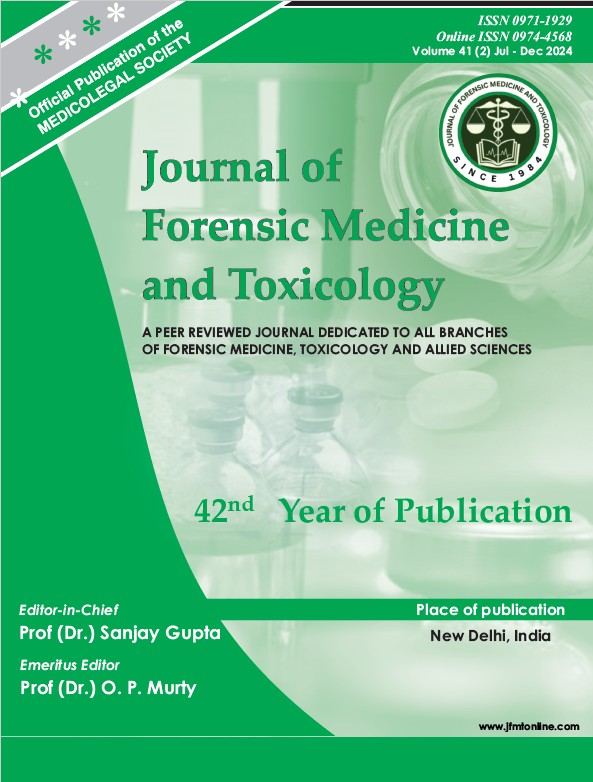Future Perspectives of Super Speciality Courses in Forensic Medicine & Toxicology in India – A way Forward
DOI:
https://doi.org/10.48165/jfmt.2025.42.3.1Keywords:
Forensic Medicine, India, Pathology, Radiology, Super-speciality courses, ToxicologyAbstract
Forensic Medicine and Toxicology (FMT) in India is undergoing a paradigm shift, with growing recognition of the need for super-speciality training to address the rising complexity of medico-legal challenges. Advances in Forensic Toxicology, Forensic Pathology, Forensic Radiology, Molecular Diagnostics, and Toxico-genomics, alongside judicial demand for precise scientific evidence, highlight the limitations of existing postgraduate curricula. This editorial article explores the future perspectives of super-speciality courses in FMT in India, examining the need, driving factors, chal \lenges, local and global opportunities. Current developments in premier institutions, including AIIMS and the National Forensic Sciences University, are paving the way for structured super-speciality training, though gaps in infrastructure, faculty expertise, and regulatory frameworks persist. International benchmarks demonstrate the potential for integrat ing advanced technologies such as artificial intelligence and digital Forensics into medico-legal practices. Initiation of super-speciality programs may further add value to the subject, strengthen its scope and recognise position of India as a global leader in Forensic field. The future of super specialty courses in Forensic Medicine in India looks promising, with several developments indicating growth and recognition of the field.
Downloads
References
Saukko P, Knight B. Knight’s Forensic Pathology. 4th ed. Boca Raton: CRC Press; 2015.
Mukherjee JB. Forensic Medicine and Toxicology. 5th ed. Kolkata: Academic Publishers; 2019.
Subramanian B. Emerging trends in Forensic medicine: an Indian perspective. Indian J Forensic Med Toxicol. 2021;15(4):1–5. doi:10.37506/ijfmt.v15i4.16553.
Supreme Court of India. Guidelines on medico-legal evidence, 2019. Available from: https://main.sci.gov.in
Dinis-Oliveira RJ. Forensic toxicology: current challenges and future directions. Forensic Sci Res. 2019;4(1):8–22. doi:10.1080/20961790.2018.1513832.
Gill JR, Ely SF. Forensic toxicogenomics: personalized medicine in medico-legal practice. Am J Forensic Med Pathol. 2018;39(4):321–6. doi:10.1097/PAF.0000000000000412.
World Health Organization. Chemical incidents and emergencies. WHO; 2020. Available from: https://www.who.int
Reddy KSN. The Essentials of Forensic Medicine and Toxicology. 34th ed. Hyderabad: K Suguna Devi; 2017.
National Forensic Sciences University. Infrastructure and facilities. Gandhinagar: NFSU; 2023.
National Medical Commission (NMC). Postgraduate medical education regulations. New Delhi: NMC; 2020.
AIIMS New Delhi. Forensic Medicine department updates. AIIMS; 2023.
Indian Council of Medical Research. Annual Report 2022–23. ICMR; 2023.
National Forensic Sciences University. Prospectus 2024–25. Gandhinagar: NFSU; 2024.
Dolinak D, Matshes E. Forensic pathology: principles and practice. 3rd ed. San Diego: Elsevier; 2020.
American Academy of Forensic Sciences. Training programs. AAFS; 2023.
European Network of Forensic Science Institutes (ENFSI). Annual report 2022. ENFSI; 2023.
Madea B. Methods in Forensic autopsy. Forensic Sci Med Pathol. 2020;16(1):1–12. doi:10.1007/s12024-019-00208-4.
Hanzlick R. Communication and ethics in Forensic medicine. Acad Forensic Pathol. 2018;8(3):622–30. doi:10.1177/1925362118797760.
Kapoor N, Singh R. Artificial intelligence in Forensic medicine: scope and challenges. Indian J Forensic Med Toxicol. 2022;16(2):45–9. doi:10.37506/ijfmt.v16i2.17852.
Sharma BR. Future of Forensic medicine in India. J Indian Acad Forensic Med. 2020;42(1):1–4. doi:10.5958/0974-0848.2020.00001.0.




